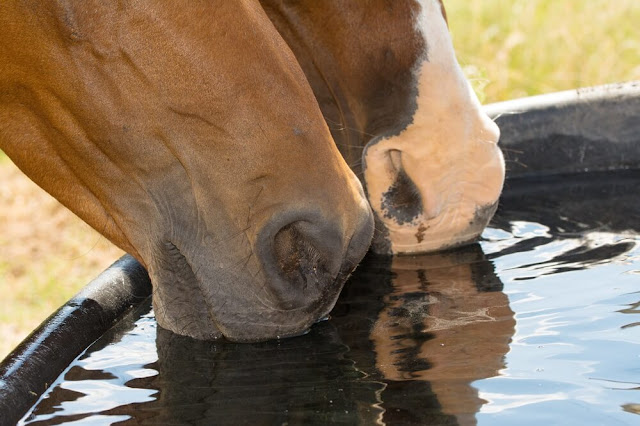What Are the Long-term Savings Associated with Using an Automatic Horse Waterer?
Nowadays, in the realm of equine care, ensuring access to clean, fresh water is paramount. However, traditional watering methods can be both time-consuming and inefficient.
Enter the automatic horse waterer, a revolutionary solution designed to streamline the watering process while offering numerous long-term benefits.
From reducing water wastage to minimizing labour costs, the advantages of automatic horse waterers extend far beyond convenience. So, let's delve deeper into how investing in this innovative technology can lead to substantial savings over time.
Maximizing Long-Term Savings with Automatic Horse Waterers
The Cost-Efficiency of Automatic Horse Waterers:
Automatic horse waterers are meticulously designed to optimize efficiency in equine hydration management. Through their ability to dispense precise amounts of water as needed, these systems dramatically cut down on wastage, a stark contrast to the spillage-prone nature of traditional troughs or buckets. By ensuring every drop is utilized effectively, automatic waterers not only conserve water but also translate into substantial cost reductions for equine facilities of any scale. This commitment to resource efficiency underscores their reputation as a financially astute investment in the long-term sustainability of equine care practices.
Reduced Labor Expenses:
Automatic horse waterers offer significant long-term savings by minimizing labour expenses. Unlike traditional watering methods that necessitate frequent refills, cleaning, and maintenance, automatic waterers function autonomously, requiring minimal human involvement. This autonomy translates to substantial time and manpower savings, as personnel are freed from the repetitive tasks associated with manual watering. With reduced reliance on labour-intensive water management, equine facilities can redirect their resources toward more pressing responsibilities, such as horse care, training, or facility maintenance.
Consequently, the operational efficiency gained through the adoption of automatic waterers not only streamlines daily operations but also contributes to lower labour costs over time, making them a wise investment for equine facilities looking to optimize their financial sustainability.
Preventing Water Contamination:
Ensuring optimal water quality is paramount for safeguarding the health and well-being of horses. Traditional troughs, prone to stagnant water, pose significant risks, fostering the growth of harmful bacteria and algae. These contaminants can lead to various waterborne illnesses, jeopardizing equine health and incurring substantial veterinary expenses.
Automatic horse waterers offer a proactive solution to this concern by maintaining a constant circulation of water, preventing stagnation, and guaranteeing freshness. By effectively reducing the likelihood of water contamination, these innovative systems serve as a preventive measure against potential health issues.
The resulting decrease in veterinary visits and treatments not only promotes equine wellness but also translates into significant long-term savings for horse owners and facilities alike, further underscoring the value of investing in automatic waterers for equine care.
Durability and Longevity:
Maximizing long-term savings hinges on the investment in top-quality equipment, and automatic horse waterers stand out in this regard. Engineered to endure the challenges of equine environments, these systems boast robust construction using durable materials resistant to corrosion, impacts, and inclement weather. Their resilience ensures longevity, with well-maintained automatic waterers capable of serving reliably for years on end.
By minimizing the frequency of replacements and the associated costs, these durable waterers exemplify a prudent investment for equine facilities seeking to optimize their financial sustainability. With their ability to withstand the rigors of daily use while maintaining peak performance, automatic horse waterers emerge as a cornerstone in the quest for long-term cost-efficiency and operational reliability.
Energy Efficiency:
Contemporary automatic horse waterers prioritize energy efficiency, integrating advanced features like insulated reservoirs and low-power consumption pumps. This strategic design not only conserves energy but also translates into tangible cost savings for equine facilities by reducing utility bills over time.
Moreover, certain models go a step further by offering solar-powered options, harnessing renewable energy sources to power their operation. This dual approach to energy optimization not only minimizes operational expenses but also mitigates the environmental footprint of equine care facilities.
By embracing sustainable technology and reducing reliance on traditional power sources, these innovative waterers not only contribute to long-term financial savings but also underscore a commitment to environmental stewardship within the equine industry.
Enhanced Hydration and Health:
Adequate hydration is fundamental to preserving the health and performance of equines. Automatic waterers play a pivotal role in facilitating consistent water consumption by ensuring uninterrupted access to clean, fresh water. This availability fosters optimal hydration levels, mitigating the risk of dehydration and its associated health complications.
By prioritizing equine well-being, automatic horse waterers not only promote physical health but also serve as a preventative measure against potential veterinary interventions and downtime due to health issues.
As a result, horse owners can experience substantial long-term savings, both in terms of reduced veterinary expenses and enhanced productivity, reinforcing the indispensable value of automatic waterers in maintaining the vitality and longevity of equine companions.
The Final Words
In conclusion, the adoption of automatic horse waterers represents a wise investment for equine facilities seeking to optimize long-term savings. By reducing water wastage, minimizing labor expenses, preventing water contamination, and offering durability and energy efficiency, these innovative systems offer a multitude of financial benefits. Moreover, by promoting enhanced hydration and equine health, automatic waterers contribute to savings in veterinary costs and downtime.
As such, integrating automatic horse waterers into equine care practices is not only a prudent financial decision but also a testament to a commitment to the well-being of horses and the sustainability of equine operations.



.jpg)


Comments
Post a Comment